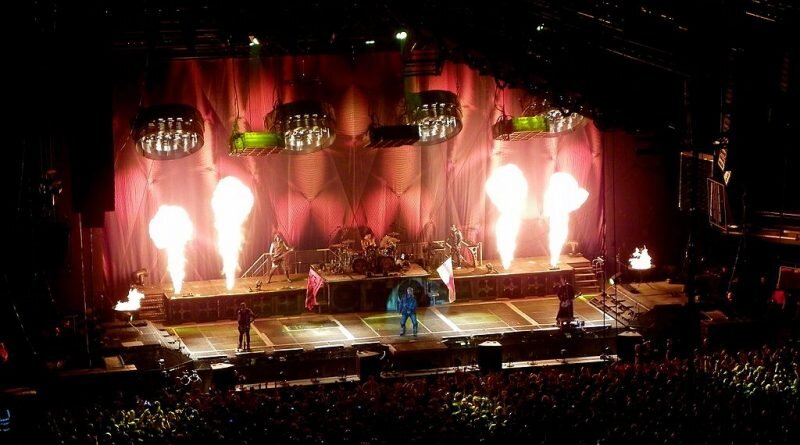Aleksander Lubina: Rammstein
Słowa klucze:
The Ogre, Der Unhold, Der Erlkönig,
Heidenröslein, Das Veilchen, Schneeweißchen und Rosenrot
Johann Wolfgang von Goethe
Franz Schubert, Wolfgang Amadeus Mozart
Volker Schlöndorf, Michel Tournier
Nagroda Goncourtów
Rammstein to fenomen – z dawnej NRD, śpiewają po niemiecku, mają fanów w całym świecie i bazuje na wątkach i motywach wielkiej tzw. kultury wysokiej. O tej ostatniej kilka zdań.
Volker Schlöndorf nakręcił w 1996 film niemiecko-francusko-brytyjski pod tytułem The Ogre (tytuł niemiecki: Der Unhold), dla którego wspólnie z Jean-Claudem Carrière napisał scenariusz oparty na powieści Michela Tourniera Der Erlkönig, za którą ten ostatni w roku 1970 otrzymał Nagrodę Goncourtów.
Film, częściowo kręcony w Malborku, wart przemyślenia, książka, częściowo o fascynacji narodowym socjalizmem, godna polecenia – może i szczególnie dziś.
Pamiętać jednak trzeba, że tłumaczenie tytułu ballady Johanna Wolfganga von Goethe Der Erlkönig (1782) jako Król olch jest najprawdopodobniej jednym z wielu nieporozumień w literaturze. Erlkönigowi bliżej do Króla elfów, Króla ogrów i do Króla potworów. Takie tłumaczenie tytułu Der Erlkönig pomaga w lepszym zrozumieniu Rosenrot Rammsteina, bo Rammstein w Rosenrot sięga po Erlköniga i Heidenröslein Goethego oraz Braci Grimm (Schneeweißchen und Rosenrot – baśń bazuje na Karoline Stahl: Der undankbare Zwerg, z roku 1818).
Goethe napisał nie tylko Polną różyczkę („Heidenröslein”), gdzie chłopiec zrywa róże, Ale też Fiołka („Das Veilchen”), gdzie dziewczyna niszczy fiołka, jako symbol serca młodzieńczego. Do Heidenröslein muzykę napisał Franz Schubert, do Das Veilchen Wolfgang Amadeus Mozart.
Heidenröslein
| Sah ein Knab’ ein Röslein stehn, Röslein auf der Heiden, War so jung und morgenschön, Lief er schnell es nah zu sehn, Sah’s mit vielen Freuden. Röslein, Röslein, Röslein rot, Röslein auf der Heiden.Knabe sprach: „Ich breche dich, Röslein auf der Heiden.” Röslein sprach: „Ich steche dich, Dass du ewig denkst an mich, Und ich will’s nicht leiden.” Röslein, Röslein, Röslein rot, Röslein auf der Heiden. Und der wilde Knabe brach es eben leiden. |
Saw a boy a little rose, little red rose on the heath, young and lovely like the morning. So he ran to have a close look at it, and gladly did. Little rose, little rose, little red rose on the heath.Said the boy: I will pick you, my red rose on the heath! Said the rose: I will prick you and I won’t stand it, and you won’t forget me. Little rose, little rose, little red rose on the heath. And the rough boy picked the rose, |
| stand, gebückt in sich und unbekannt; es war ein herzigs Veilchen. Da kam ein’ junge Schäferin mit leichtem Schritt und munterm Sinn daher, daher, die Wiese her und sang.Ach! denkt das Veilchen, wär’ ich nur die schönste Blume der Natur, ach, nur ein kleines Weilchen, bis mich das Liebchen abgepflückt und an dem Busen matt gedrückt, ach, nur, ach nur ein Viertelstündchen lang! Ach, aber ach! Das Mädchen kam |
A violet in the meadow stood, with humble brow, demure and good, it was the sweetest violet. There came along a shepherdess with youthful step and happiness, who sang, who sang along the way this song.Oh! thought the violet, how I pine for nature’s beauty to be mine, if only for a moment. for then my love might notice me and on her bosom fasten me, I wish, I wish if but a moment long. But, cruel fate! The maiden came, |
„Das Veilchen”
| Ein Veilchen auf der Wiese stand, gebückt in sich und unbekannt; es war ein herzigs Veilchen. Da kam ein’ junge Schäferin mit leichtem Schritt und munterm Sinn daher, daher, die Wiese her und sang.Ach! denkt das Veilchen, wär’ ich nur die schönste Blume der Natur, ach, nur ein kleines Weilchen, bis mich das Liebchen abgepflückt und an dem Busen matt gedrückt, ach, nur, ach nur ein Viertelstündchen lang! Ach, aber ach! Das Mädchen kam |
A violet in the meadow stood, with humble brow, demure and good, it was the sweetest violet. There came along a shepherdess with youthful step and happiness, who sang, who sang along the way this song.Oh! thought the violet, how I pine for nature’s beauty to be mine, if only for a moment. for then my love might notice me and on her bosom fasten me, I wish, I wish if but a moment long. But, cruel fate! The maiden came, |
| Mozart dodał poniższy wers: | |
| Das arme Veilchen! es war ein herzigs Veilchen. | Poor little violet! It was the sweetest violet. |
Tekst Rammstein:
| Sah ein Mädchen ein Röslein stehen Blühte dort in lichten Höhen Sprach sie ihren Liebsten an ob er es ihr steigen kannSie will es und so ist es fein So war es und so wird es immer sein Sie will es und so ist es Brauch Was sie will bekommt sie auch Tiefe Brunnen muss man graben Der Jüngling steigt den Berg mit Qual Sie will es und so ist es fein Tiefe Brunnen muss man graben An seinen Stiefeln bricht ein Stein Sie will es und so ist es fein Tiefe Brunnen muss man graben Tiefe Wasser sind nicht still
|
A girl saw a little rose It bloomed there in bright heights She asked her sweetheart if he could fetch it for herShe wants it and that’s fine So it was and so it will always be She wants it and that’s the custom Whatever she wants she gets Deep wells must be dug The boy climbs the mountain in torment She wants it and that’s fine Deep wells must be dug At his boots, a stone breaks She wants it and that’s fine Deep wells must be dug Deep waters don’t run still |
https://www.youtube.com/watch?v=5hTC_JFQ3IQ
https://www.youtube.com/watch?v=JS91p-vmSf0
https://www.youtube.com/watch?v=28IIJH-qfoE
Balladę Goethego wykorzystuje Andrzej Sapkowski w Pani Jeziora.
Aleksander Lubina
Tytułowe foto: Mike Lawrence (Rammstein) [CC BY-SA 2.0], via Wikimedia Commons


